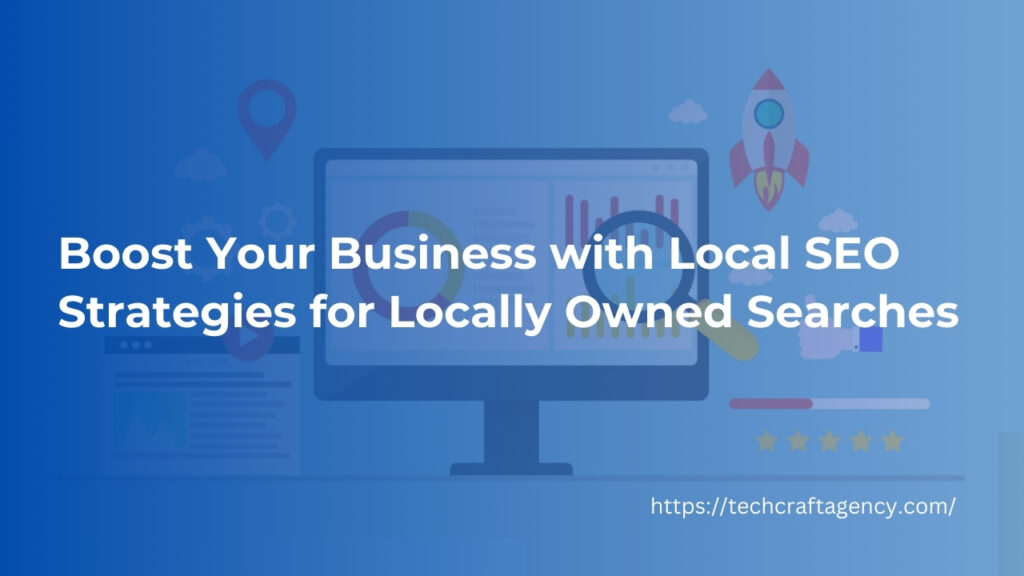Local searches play a vital role in connecting customers with businesses in their area. For small, locally-owned businesses, optimizing for local searches can greatly increase visibility and customer engagement. In this article, we’ll delve into the strategies and best practices for optimizing your business for “locally owned” searches. that’s why you need to know Boost Your Business with Local SEO Strategies for Locally Owned Searches
Understanding the Importance of Local Search
Local searches are searches performed with the intent of finding businesses, products, or services within a specific geographic area. When users search for “locally owned” businesses, they are often looking for authentic and community-oriented establishments. By optimizing for these searches, businesses can attract customers who prioritize supporting local enterprises.
Key Strategies for Optimizing for “Locally Owned” Searches
Optimizing for “locally owned” searches involves implementing several key strategies to ensure that your business appears prominently in local search results. Here’s how you can optimize your business to align with the preferences of local searchers:
1. Include Locally-relevant Keywords
Integrate locally relevant keywords into your website’s content, meta descriptions, and title tags. This includes incorporating the name of your city, region, or neighbourhood to signal to search engines that your business is associated with a specific location. For instance, if you own a bakery in Seattle, incorporating phrases like “Seattle bakery” or “best bakery in Seattle” can enhance your local search visibility.
2. Create A Google My Business Profile
Setting up and optimizing a Google My Business profile is crucial for local search optimization. Ensure that you provide accurate and comprehensive information about your business, including your address, phone number, business hours, and a compelling business description. Additionally, regularly updating your profile with posts, photos, and customer reviews can boost your visibility in local searches.
3. Leverage Local Business Directories
List your business on popular local business directories such as Yelp, Yellow Pages, and Bing Places for Business. These platforms can significantly enhance your online presence and improve your local search rankings. Consistent and accurate business information across different directories reinforces the legitimacy of your business in the eyes of search engines.
4. Cultivate Local Reviews And Testimonials
Encourage your satisfied customers to leave reviews and testimonials on platforms like Google My Business and Yelp. Positive reviews not only provide social proof of your business’s credibility but also contribute to improved local search rankings. Responding to reviews, both positive and negative, demonstrates your commitment to customer satisfaction and further enhances your local reputation.
5. Develop Locally-focused Content
Create content that is tailored to your local audience, such as blog posts, articles, or videos that highlight local events, community involvement, or regional services. By showcasing your connection to the local area, you establish a stronger relevance to local searches, thereby increasing the likelihood of being discovered by nearby customers.
6. Mobile-friendly And Responsive Website
Ensure that your website is optimized for mobile devices, as a large proportion of local searches are conducted on smartphones. A mobile-friendly and responsive website not only provides a better user experience but also sends positive signals to search engines, potentially leading to higher local search rankings.

Measuring and Refining Your Local Search Optimization Efforts
After implementing the strategies outlined above, it’s crucial to monitor and measure the effectiveness of your local search optimization efforts. Utilize tools such as Google Analytics and Google My Business Insights to track the performance of your local search visibility, website traffic, and customer engagement.
By analyzing these metrics, you can identify trends, assess the impact of your optimization efforts, and make data-informed decisions to refine your local search strategy. Continuously adapting and refining your approach based on performance data is essential for maintaining and improving your local search presence.
Frequently Asked Questions on Boost Your Business with Local SEO Strategies for Locally Owned Searches
How Can I Optimize My Website For Local “Locally Owned” Searches?
To optimize your website for local “locally owned” searches, ensure your website includes relevant keywords, add location-specific landing pages, claim your Google My Business listing, and encourage positive online reviews.
Why Are Local “Locally Owned” Searches Important?
Local “locally owned” searches are important as they help businesses connect with potential customers in their local area. By optimizing for these searches, you can increase your visibility and attract more relevant traffic to your website.
What Are The Main Factors To Consider For Local “Locally Owned” Seo?
When optimizing for local “locally owned” SEO, consider factors such as relevant keywords, local citations, mobile-friendliness, website speed, online reviews, and consistent and accurate NAP (Name, Address, Phone number) information across all platforms.
How Does Claiming A Google My Business Listing Help With Local “locally Owned” Seo?
Claiming a Google My Business listing allows you to provide accurate and up-to-date information about your business, including your address, phone number, website, and business hours. This helps Google understand your business better and improves your visibility in local “locally owned” searches.
Conclusion
Optimizing for “locally owned” searches is a strategic imperative for small businesses seeking to connect with their local customer base. By implementing the recommended strategies, creating locally relevant content, and consistently monitoring performance, businesses can enhance their visibility in local searches and attract customers who actively seek to support locally owned enterprises.
Remember, local search optimization is an ongoing process that necessitates a commitment to accurate business information, engaging content, and a customer-centric approach. By prioritizing these elements, businesses can effectively position themselves as valuable and trusted members of their local communities within the digital landscape.

